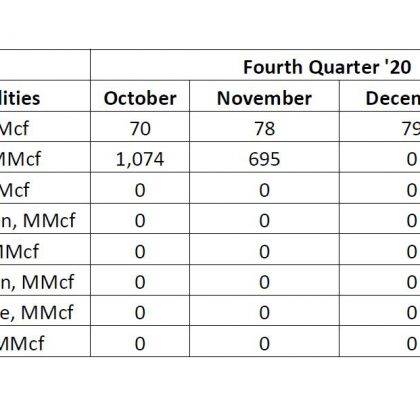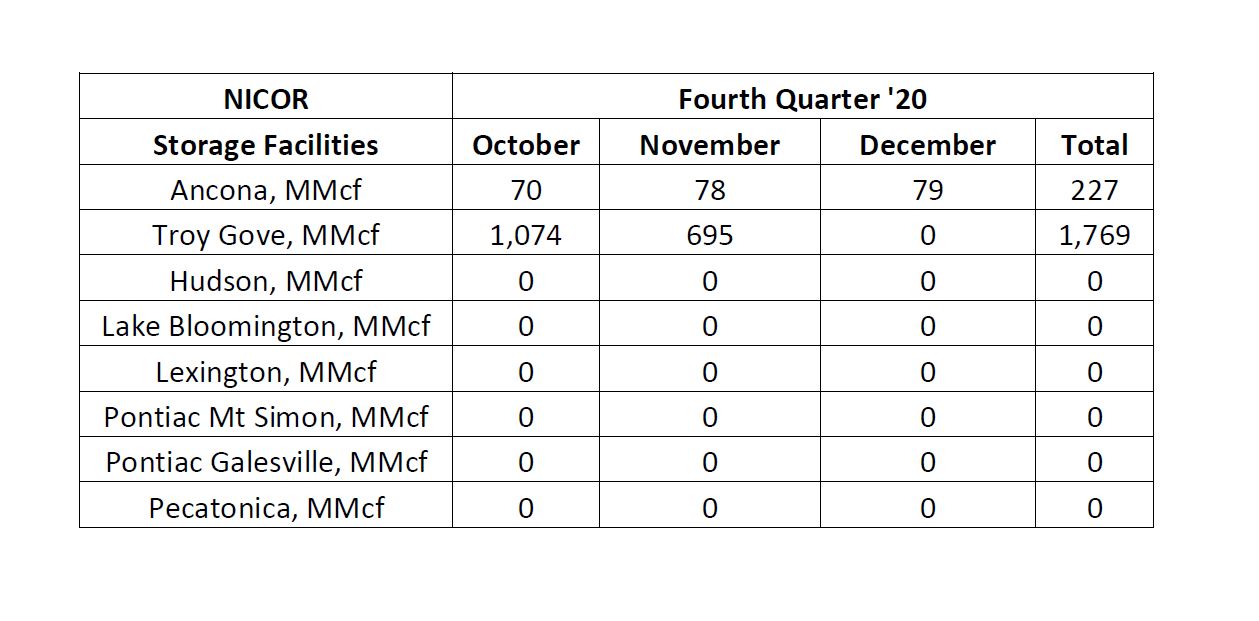Feature your business, services, products, events & news. Submit Website.
Breaking Top Featured Content:
Clear and Present Danger: The Regulators

Regulators reward Nicor with record rate hike despite utility’s “cost over-runs,” “extraordinary spending”
ANCONA, Ill. (NEXSTAR) — The same state regulatory agency that granted Nicor Gas permission to bury gas deep underground in rural Livingston county decades ago also approved the company’s request for a record $240 million rate hike, despite evidence of an ongoing methane leak that has persisted for several years.
“Commissioners don’t usually say no to rate hikes,” former Illinois Commerce Commission administrative law judge John Albers explained. “I have seen the ICC be more assertive in its regulatory authority in prior years.”
The four members of the Illinois Commerce Commission who voted to approve the utility company’s third rate hike in four years — three of them appointed by Governor J.B. Pritzker — shrugged off concerns about “extraordinary spending” raised by the Attorney General’s office. In state records filed with the ICC, the Attorney General’s office said Nicor “failed to explain” why the company “regularly and substantially [exceeded] its budget” with $50.6 million in “cost over-runs” on costly projects “at ratepayer expense.”
Nicor argued it “can face unexpected physical and natural conditions at any and every phase of a project,” and “that some individual projects will incur costs higher or lower than estimated based on the presence or absence of various field conditions.”
After a Target 3 investigation revealed an ongoing methane leak at Nicor’s largest gas storage field in rural Ancona, Nicor spokeswoman Jennifer Golz outlined a number of recent infrastructure upgrades at the company’s oldest gas storage site in Illinois.
“We have replaced piping at our Ancona facility, enhancing the collection system, and this year completed installation of an additional shallow gas collection well,” Golz said in an email last October, though the individual project expenses were not disclosed.
Golz was responding to new questions about the scope of the methane leak after gas loss records were disclosed in a Freedom of Information Act request, though the company initially pressured state regulators at the Illinois Department of Natural Resources to redact the report and block its release to the public.
Initially, attorneys at IDNR said they could not find any records that included Nicor’s gas loss reports. Two weeks later, they said their internal search function wasn’t working properly, and handed over redacted records that did not show how much gas was leaking from the underground storage reservoir.
“They will not release the records,” former IDNR field manager Jim Stephens said. “If they did that, then they would be admitting they’ve got a problem.”
When Nicor’s Director of Storage Joe Deters submitted the gas loss report, he cited an irrelevant portion of Illinois state law to persuade state regulators to bury the data from public scrutiny and keep it “confidential.”
Target 3 investigators challenged the state’s redaction and won. The unredacted report revealed an alarming volume of methane had started to migrate out of its original storage reservoir and move closer to the surface at Troy Grove, in addition to the ongoing underground leak at the Ancona-Garfield site, which had previously been reported.
The redactions had been covering up data that showed Nicor reported 675 million cubic feet of natural gas had escaped its original underground storage reservoir in Ancona in 2020, and in a span of four months, 3.7 billion cubic feet escaped the storage formation at a separate site in Troy Grove.
The company explained these amounts as the volume of gas they managed to collect in underground wells, but did not specify exactly how much more gas leaked out of the original reservoir that was not captured by their secondary collection system.
“These volumes are not truly lost gas because they are collected before reaching the surface,” Nicor Reservoir Integrity Engineer Kelly McGough wrote in an October letter to IDNR. Then, she claimed an IDNR inspector had weakened the reporting guidance and suggested the company would no longer submit the gas loss data at all, a claim the Pritzker administration quickly rebuffed.
“Based on more recent guidance from Ernie Kierbach from Illinois DNR, however, we understand the Illinois DNR’s intent under Section 240.1853(d) is that Nicor Gas report the volume of gas that reaches the surface, rather than the volume of gas recovered in shallower zones before it reaches the surface,” McGough wrote.
In other words, Nicor told the state they would stop reporting the monthly volume of the underground leak, and only report the volume of methane plumes they could measure with helicopter-mounted thermal imaging scanners after the planet-warming gas had already reached the surface and polluted the atmosphere.
“There’s no reason to do that unless you’re just covering it up,” Stephens said.
Pritzker administration to Nicor: “show your math,” prove volume of methane leak
A spokeswoman in Governor Pritzker’s office strongly refuted the claims in Nicor’s letter, and said the company “misunderstood” and “mischaracterized” the guidance from IDNR’s field manager, Ernie Kierbach.
“The field manager suggested Nicor show their math regarding the gas that escapes from the reservoir,” Pritzker spokeswoman Jordan Abudayyeh responded in an email. “He explained that they should identify the gas that escapes the reservoir, identify the quantity captured, and finally identify any which is lost to the atmosphere rather than report it all as a loss.”
“I would like to see those numbers,” Albers said. “All that escaped gas has to be replaced. Customers are paying for that.”
Nicor has not responded to the latest requests for an explanation, but visits to the Ancona storage site show signs that the company has already removed devices that would allow them to monitor underground gas pressure and track a leak. Email records and a review of the facility show the company removed pressure gauges and plugged and abandoned two observation wells that were used to send warning signs when gas was building pressure and moving closer to the surface. The company still maintains observation wells at other locations on the premises.
Utility watchdogs at the Citizen’s Utility Board claim inventory problems at storage facilities can impact drive gas bills higher.
“Leaks affect consumers,” CUB Executive Director David Kolata said. “Essentially, you have less gas. So it raises prices. And we’re paying for these storage fields in our rates.”
Albers said more people in power should take action to stop the leak, which he says poses a real cost to consumers, and threatens the environment.
“I am very frustrated and offended that no one in authority seems to care about this issue,” Albers said.
Attorney General Kwame Raoul said, “We have been on it,” but said he doesn’t “like to go too deep into ongoing investigations.”
In follow up conversations with Raoul’s office, a spokeswoman said they can only enforce violations after state regulators at the Illinois Department of Natural Resources or the Illinois Environmental Protection Agency issue a citation or recommend enforcement action.
“We have not received information to support allegations of ongoing violations,” Raoul’s spokeswoman Annie Thompson said.
Emails obtained under the Freedom of Information Act show Brian Navarrete, the state’s Assistant Attorney General, contacted Dan Brennan, IDNR’s Director of Oil and Gas Management, on Wednesday night, October 14th, 2020, at 6:38 p.m. Navarette sent his email to Brennan exactly one minute after our first report in this series, “The Leak,” had just finished airing at 6:37 p.m. on the same night.
By Thursday morning, Brennan had reached out to Ernie Kierbach, the field manager who is working directly with Nicor to regulate the storage field at Ancona. The details of the email exchanges are redacted under attorney-client privilege, but sources in the Attorney General’s office confirm they were discussing how to respond to the Target 3 report.
“The ICC can order it shut down,” Albers said. “They’ve had 50 years to fix this problem and haven’t done so.”
Nicor says without the Ancona storage field, “more than 700,000 Illinois customers would be without the energy they expect and rely on during extreme weather events.”
“Their field is simply ‘too big to close,'” Albers said.
State lawmakers filed a proposal to increase regulation and monitoring of gas leaks last year, but the measure stalled. The House and Senate return for a condensed 2022 legislative session later this week.
Continue Reading at WHO13.com here









